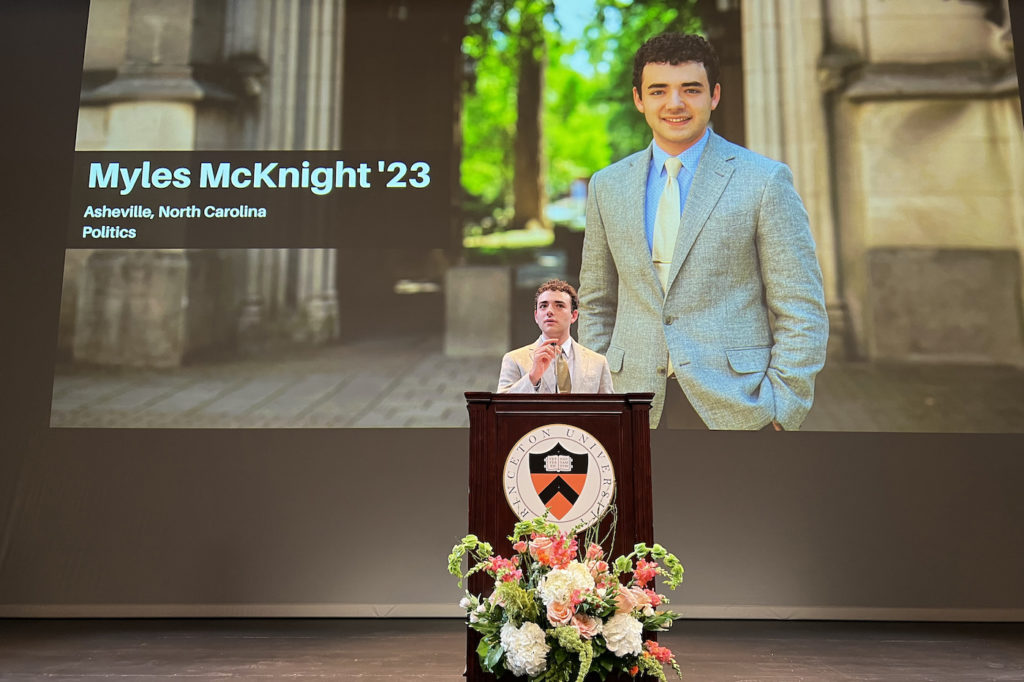Note from the Editors: The following is an address delivered by Princeton University senior Myles McKnight on September 1 to members of Princeton’s incoming freshman class during their orientation. In his remarks, Mr. McKnight explained why freedom of expression is fully integrated with the truth-seeking mission of the university, and admonished students to help build a common culture that fosters and enhances participation in the truth-seeking project. The speech has been lightly edited for clarity.
Good afternoon!
My name is Myles McKnight. I’m a senior in the Politics Department, and I’m currently the President of the Princeton Open Campus Coalition, a group of students working to promote the values of free speech, intellectual freedom, and robust discourse on campus. I’m delighted to speak to you today at what is—in my view—the most important session of your freshman orientation. I say this, not to self-aggrandize, but because the values and commitments we’re discussing this evening are absolutely essential to the fulfillment of our university’s truth-seeking mission. (And, by the way, as the unifying good of our university, that mission is the very thing that makes having and maintaining our university a worthwhile project in the first place.)
These days, the free speech fight on college campuses almost always shines with some sort of political gloss. In one sense, that’s understandable; as honest people, we should admit that the views that most often provoke censorship and backlash on campus tend to be conservative. At the same time, that the fight for free speech has become partisan is a true shame. Free speech is neither a conservative nor a progressive value. It is a truth-seeking value. In the university context, it is an academic value—as deeply rooted in the identity of the university as anything could possibly be. Just as you couldn’t have a university without scholarship, you couldn’t have a healthy scholarly culture without the opposition, open dissent, and vigorous argument that free speech protects.
Start your day with Public Discourse
Sign up and get our daily essays sent straight to your inbox.The reason for this is plain. We are all fallible human beings. Each and every one of us believes some things very, very strongly—and I hate to break it to you, but some of those things are just plain wrong. What’s more, not only are we fallible human beings, we are fallible human beings living in a fallible culture! That is to say, our society has almost certainly settled on some basic ideas about what is true—either morally or empirically—that just aren’t so. We know this of previous societies; how could it possibly be untrue of our own?
Free speech is neither a conservative nor a progressive value. It is a truth-seeking value. In the university context, it is an academic value—as deeply rooted in the identity of the university as anything could possibly be.
A Culture of Truth Seeking
Now, the thing that gives us some hope that we could someday abandon our own false conceptions of truth—or even let go of false dogmas so deeply embedded in our cultural framework such that very few question them—is free speech. It is the free exchange of ideas and the entertainment of dissenting points of view—offensive though they often are—that gives us hope that we can eventually arrive at some grasp of the truth.
But that hope is crushed for all of us—no matter our political orientation—when free speech is either formally injured, as by overt censorship, or when an informal academic culture atrophies and expressions of dissent either
- are no longer held in high esteem,
- are no longer regarded as opportunities for engagement and intellectual growth, or
- provoke social backlash and marginalization, causing students with unique viewpoints to shut up rather than engage.
The point I just made is crucial, so let me restate it. Formal protections for free speech are important, but the informal culture bearing on the expression of diverse points of view can be even more critical when the truth-seeking ideal is what’s at stake.
Therefore, we should all celebrate our university’s formal adoption of the Chicago Free Speech Principles, which provide robust protections for expressive freedom and protect your rights as new members of this community to speak and write openly. At the same time, we should recognize that each of us has a critical role to play in making sure our common good—the truth-seeking ideal—is cherished and protected by our shared culture. No matter how impressively our institution formally stands behind free speech, and no matter how spot-on Princeton’s President Chris Eisgruber is in his defense of it, the truth-seeking endeavor will be decimated if Princeton’s students—you and I—fail to foster an atmosphere in which the vigorous exchange of ideas is considered sacred.
Before I go on, I want to avert a misunderstanding. I am not saying that our institution is perfect and that the burden to promote the core values of free speech and intellectual diversity falls solely on us as students. Of course, we should push back when the university falters. But what I’m getting at is a more subtle and much more personal responsibility incurred by each of us at the very moment we arrived on campus. I want to offer two real-world examples that illustrate how you, as students, can either do your part to foster an intellectually open and diverse culture or do real damage to that aspiration.
Fallibility and Humility
I’ll start with the bad. This example is an experience I had here just last spring.
In February, an activist student group staged a public protest on campus. The subject of the protest, like the cause of the activist group, was a difficult one. It invites disagreement among reasonable, intelligent people of goodwill from across the political spectrum.
Interested in the protest as I was, I stopped by to see what it was all about. I engaged in a slightly heated but generally healthy back-and-forth with the leader of the group, and some student journalists recorded the exchange. I regarded our exchange as intense but generally productive. I was challenged, and so was he.
A few days later, I was amazed to learn that my interlocutor, alleging discomfort with our interaction, took out something called a “no communication order” against me, the university’s equivalent of a restraining order. On pain of severe disciplinary action, I was no longer allowed to engage in discourse with my one-time interlocutor. Now, I should mention that, to the university’s credit, this order was lifted after I raised the absurd situation to some higher-level deans. Still, something remains to be learned from this experience.
If you are made uncomfortable when someone challenges you, even if they do it publicly and vigorously, be thankful for the opportunity to more critically interrogate and defend your own views. Engage. Be open and fair-minded.
I understand that my interlocutor was made uncomfortable in front of his cadres when faced with the questions and challenges I posed. But to this I say, “so what?” What, exactly, exempted him from the self-respecting intellectual responsibility of having to engage with opposition, especially in the context of a public-facing protest? Did he assume he was infallible—that his views were just simply unquestionable—and discard out of hand the benefit of engagement with his otherwise-minded peers? Or did he want to save himself the trouble, or perhaps the embarrassment, of having to defend his positions publicly?
What we have here is an example of what happens when we assume our own infallibility, when we allow ourselves to fall into the sin of intellectual arrogance. And my charge here is this: be humble. If you are made uncomfortable when someone challenges you, even if they do it publicly and vigorously, be thankful for the opportunity to more critically interrogate and defend your own views. Engage. Be open and fair-minded. And if you come to find that your views are probably wrong, be loyal to your best understanding of the truth. Change your views. Honoring one’s ego at the expense of honoring the truth-seeking goal is antithetical to our work as activists, students, truth-seekers, and good friends. Be wary of the cultural currents on our campus that can sometimes make insulating oneself from dissent seem like an intellectually healthy course of action. It never is.
Productive Exchange
My second example is more positive. In June 2020, as racial issues were again at the forefront of our national conversation, my group, the Princeton Open Campus Coalition, published a letter raising concerns about a series of demands echoing throughout many corners of our community. Again, I want to recognize that some of these demands were the subject of legitimate debate among reasonable people. But instead of engaging with the content of my group’s letter on its own terms, many students took to shameless bullying, harassment, and other vile behavior on social media. Long story short, it was an ugly situation all around.
But one aspect of this experience stood out in a brilliant and positive way. I’m referring to an exchange between the former president of my group and a good friend of mine in the Daily Princetonian. Now, these two could not disagree more strongly on the content of the letter, and if you go back and read the exchange, you will find that no punches were pulled. Nothing was held back. Still, that healthy back-and-forth was enough to cut through the ugly noise and vitriol in some corners, and that series of exchanges helped reframe the matter as a serious and difficult disagreement that could occupy the intellectual attention of two very impressive thinkers. By deciding to write an op-ed in the Daily Princetonian, the student who challenged the content of my group’s letter did our entire community, and indeed my group, a massive favor. Almost overnight, the state of our community’s discourse was greatly enhanced.
Resist the temptation to behave like those exhibitionists who, instead of engaging humbly and honestly with a serious point of view, chose to bully their peers and presuppose their own righteousness.
The lessons here are manifold, but I want to highlight just one. It is this: the way a single individual chooses to engage with dissent can radically shift the state of the truth-seeking enterprise on campus, for better or for worse. Be like JJ, my friend who wrote a short and impactful piece in our school newspaper. Resist the temptation to behave like those exhibitionists who, instead of engaging humbly and honestly with a serious point of view, chose to bully their peers and presuppose their own righteousness.
Dr. Cornel West—one of America’s prominent public intellectuals—often remarks that the entire point of a liberal arts education is to unsettle the student. He could not be more correct. You should not feel intellectually comfortable here. You should not feel intellectually or ideologically “safe.” If you do, something has gone terribly, terribly awry. Embrace discomfort. Remind yourself constantly of your own fallibility. Presume nothing, and acknowledge that you will be faced with opportunities to either enhance our culture of truth-seeking or to harm it. The choices you make in such circumstances will define what sort of Princetonian you are, so make them carefully.
Welcome to Princeton, a place of truth-seeking. Celebrate that you now have an opportunity to participate in that august mission under the auspices of an institution that has done much to protect the core values of viewpoint diversity and academic freedom. Challenge the institution when it falters or disrespects those ideals, as it often does. But remember, without your own commitment to these principles—in letter and in spirit, in word and in deed—our institutional commitments can only do so much. Thank you.














